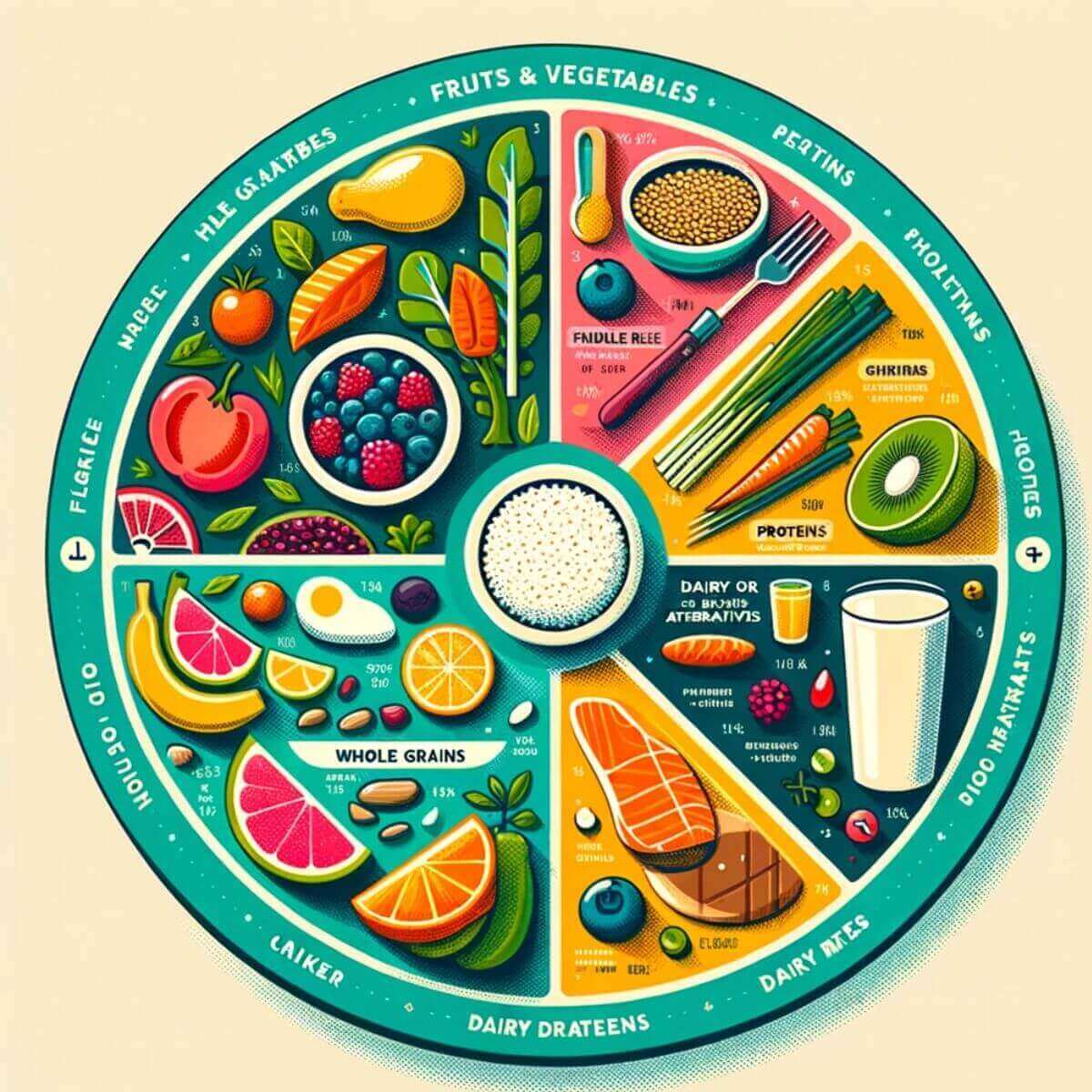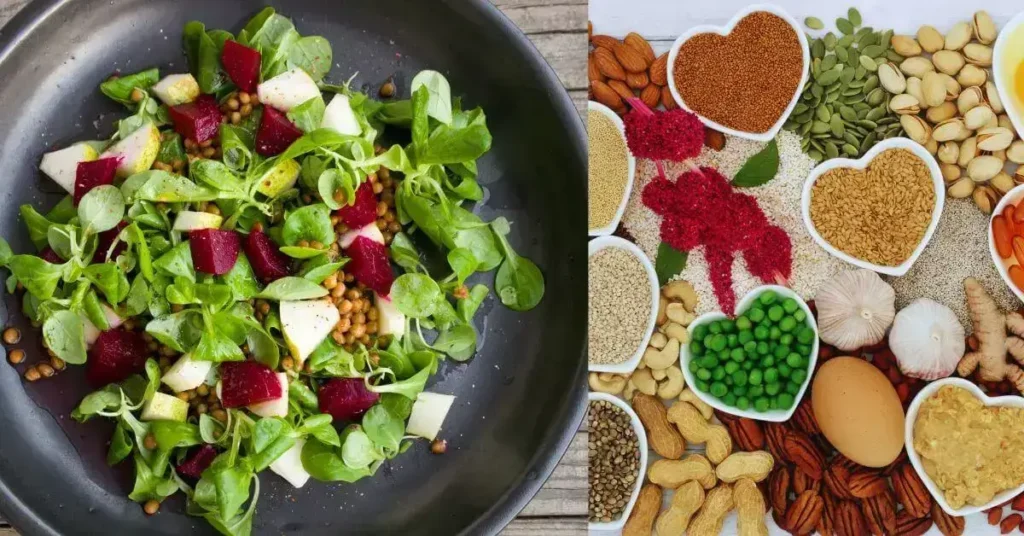A balanced food diet is crucial for staying healthy and feeling your best. It involves consuming various foods in the correct proportions and amounts to maintain a healthy body weight.
General Dietary Guidelines:
- Aim for a colorful plate: Include at least 5 servings of fruits and vegetables daily. They can be fresh, frozen, canned, dried, or juiced. Fruits and veggies are packed with essential vitamins, minerals, and fiber.
- Choose whole grains: Base your meals around whole grains like brown rice, whole wheat pasta, and whole grain bread. They’re richer in fiber and nutrients compared to their white counterparts.
- Incorporate protein: Include protein sources such as beans, pulses, fish, eggs, and lean meats. They’re vital for growth, repair, and maintaining good health.
- Opt for healthier fats: Use unsaturated oils and spreads in moderation. These more beneficial fats can help lower cholesterol levels.
- Stay hydrated: Drink plenty of fluids, aiming for 6 to 8 glasses daily. Water, lower-fat milk, and sugar-free drinks are good choices.
- Limit sugar, salt, and saturated fat: Reducing these can reduce your risk of chronic diseases like heart disease, stroke, and some cancers.
Special Considerations:
- Children’s nutrition: The Eatwell Guide is unsuitable for children under 2 due to their unique nutritional needs. From ages 2 to 5, children should gradually start to eat similar foods as the rest of the family.
- Individual dietary needs: Those with specific dietary requirements or medical conditions should consult a healthcare professional for personalized advice.
Understanding Food Groups:

- Fruits and Vegetables: Strive to eat a wide array of vitamins, minerals, and fiber. Remember, a serving isn’t as big as you might think – a medium fruit, a cup of salad, or a half-cup of cooked veggies counts as one.
- Starchy Foods: Make these the base of your meals for energy and fiber. Opt for whole grain or higher fiber versions when you can.
- Dairy and Alternatives: These are key for protein and calcium. Choose lower-fat and lower-sugar options to keep bones strong without extra calories.
- Proteins: Diverse sources like meat, fish, eggs, and legumes are essential. Aim for lean meats, and try to get at least two servings of fish per week, including one of oily fish for omega-3 fats.
- Fats: Choose unsaturated options and use them sparingly. Small changes like switching to unsaturated spreads can make a big difference.
Making Healthier Choices:
Reducing saturated fat, sugar, and salt intake is essential for a healthier lifestyle. For those looking to lose weight or improve their diet, the NHS offers a free 12-week plan to help establish healthier habits. Remember, balance is critical, and gradual changes toward a more nutritious diet can significantly benefit your overall health.
Frequently Asked Questions (FAQs): Balanced Food Diet
Q1: What is a Balanced Food Diet?
A balanced diet includes a variety of foods in the right proportions to provide the body with the nutrients it needs to function correctly, support growth, and maintain a healthy weight.
Q2: How many servings of fruits and vegetables should I eat daily?
You should aim for at least 5 portions of fruits and vegetables daily. This includes fresh, frozen, canned, dried, or juiced options.
Q3: What are whole grains, and why are they important?
Whole grains have all parts of the grain (bran, germ, and endosperm) intact, providing more fiber, vitamins, and minerals than refined grains. They are essential for digestive health and can help prevent chronic diseases.
Q4: How can I reduce my saturated fat, sugar, and salt intake?
To reduce these, choose foods with lower levels of each, prepare healthier methods like grilling or steaming, read food labels to make informed choices, and limit the consumption of processed and fast foods.
Q5: What are some healthy protein sources?
Healthy protein sources include lean meats, poultry, fish, eggs, dairy, beans, pulses, and nuts. Aim for a variety of sources to get a wide range of nutrients.
Q6: How much water should I drink a day?
Drinking 6 to 8 glasses of fluids daily, including water, lower-fat milk, and sugar-free drinks, is recommended.
Q7: Can I eat snacks?
Yes, snacks are okay as long as they’re part of a balanced diet. Opt for healthier snacks like fruits, nuts, and lower-fat dairy products instead of high-sugar and high-fat options.
Q8: Do I need to follow a special diet if I have a medical condition?
If you have a medical condition or special dietary needs, consult a doctor or registered dietitian for personalized advice and meal planning.
Conclusions
- Eat a Variety: A balanced diet is diverse, including fruits, vegetables, whole grains, proteins, and healthy fats in the proper proportions.
- Portion Control: Understanding and consuming the right amount of food is crucial to maintaining a healthy body weight.
- Healthier Choices: Reducing saturated fat, sugar, and salt intake is vital for reducing the risk of chronic diseases.
- Stay Hydrated: Proper hydration is a vital part of overall health.
- Tailored Advice: Individuals with specific health conditions or dietary requirements should seek tailored advice from healthcare professionals.
- Lifestyle Integration: Adopting a balanced diet should be part of a broader healthy lifestyle that includes regular physical activity and managing stress.
Executing these guidelines can help you maintain good health, feel your best, and reduce the risk of disease. Making small, sustainable changes towards healthier eating habits is a positive step towards a healthier life.


